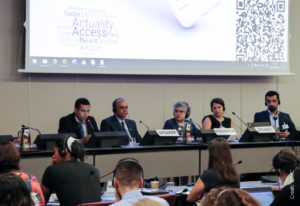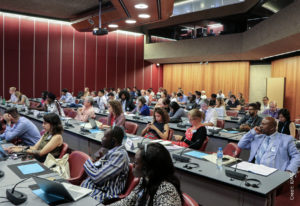High-level participation, rich insights from NGOs participants, and a strong focus on data and evidence: this year’s UNHCR NGO consultations left us inspired and demonstrated how valuable the learning experience becomes when diverse partners come together to share views and jointly advance practice. The event highlighted the key role that NGOs have to play in many aspects related to forced displacement response, and specifically when it comes to improving the relevance and impact of data, rightfully reminding us of the people behind the numbers.
In JIPS, we were happy to be part of the event and together with UNHCR and IDMC organise a session on “IDPs and Data: Evidence Across the Displacement Continuum”. Aiming to share good practices to overcome persistent challenges in producing reliable data and shared evidence in IDP situations, the session gave the floor to Dr. Farshid Farzan (Welthungerhilfe, Afghanistan), Anna Geller (Danish Refugee Council / Protection Cluster co-lead, Somalia), and Dana Wso (Qandil, Iraq).
Through this article we’d like to share with you what we learned from the discussions around IDPs and data as well as the other sessions we attended, including:

The IDP and data session at this year’s UNHCR NGO consultations opened with a panel composed of: Sumbul Rizvi (moderator, UNHCR), Dr. Farshid Farzan (Welthungerhilfe, Afghanistan), Anna Geller (DRC / Protection Cluster co-lead, Somalia), Dana Wso (Qandil, Iraq), and Ismael Gamboa Ocampo (UNHCR’s Global Youth Advisory Council).
For the second year in a row UNHCR’s NGO consultations included a session on IDPs and data. The fully packed room and truly sound discussion, including with UNHCR senior management, demonstrated the great interest for the topic. Clearly, NGO participants welcomed and encouraged UNHCR’s increasing focus on data, including through the Joint Data Centre on Forced Displacement with the World Bank, and growing commitment for a more predictable response in IDP situations.
During the session, we heard from experiences in Somalia, Afghanistan and Iraq, but also Japan, Kenya and other contexts. While the displacement situations in these countries are vastly different – ranging from conflict settings to disaster-induced displacement, and from emergency to severely protracted crises – there were a number of commonalities when it comes to identifying good practices to collect, analyse and use data on internal displacement to inform early warning and preparedness, targeting and protection, as well as to achieve collective outcomes. So, let’s have a deeper look into these:
This won’t be new to our regular readership but is something we can’t emphasise enough in JIPS. From early warning and preparedness to collective humanitarian-development outcomes on internal displacement, a multi-stakeholder approach is essential. This involves national and local government, humanitarian and development actors, NGOs and affected communities (internally displaced persons and hosts) alike. One way which has proven useful to foster and sustain such a broad collaboration is through multi-stakeholder coordination platforms, both at operational and political levels. This is something we always do in profiling exercises, and similar approaches have been taken in Afghanistan, Somalia, Kenya, and Japan.
In this context, participants also underlined the importance of jointly analysing the data to build consensus with relevant stakeholders, including authorities, and ensure their buy-in on the results. NGOs should be part of this process as they can inform and enrich the analysis through their “historical memory” and often strong ties to affected communities.
This allows to ground-truth the information to be used for advocacy and decision-making purposes, but also highlights the – simple but important – fact that making better use of data is a key mechanism for including IDP voices and that of the marginalised (such as women, youth, disabled and elderly) in programme design, interventions, targeting etc. Good practice examples shared to achieve this included inter-agency call centres and complaints mechanisms, and awareness raising and training initiatives.
Combining qualitative and quantitative data collection methods, they emphasised, leads to richer analysis that can more effectively inform targeting, support protection outreach efforts and legal aid and complaints mechanisms. This is also why we usually mix methods in profiling and durable solutions analysis, to get not just an accurate picture of the problem (how many people are displaced, their demographic profile, etc.) but also an in-depth understanding of their experiences of displacement, including intentions, preferences and obstacles in regards to solutions.

We were excited to see the high interest from NGO participants for the topic of IDPs and data at UNHCR’s NGO consultations 2019, and were left inspired by the rich and insightful discussions.
Many other sessions were equally interesting and relevant to us, as they discussed topics that we repeatedly struggle with in profiling exercises:
How can we get better at obtaining adequate protection-related information? This topic came up in various sessions. As participants observed, all too often data collection efforts are duplicated or overlapping, resulting in displaced populations being asked the same sensitive questions again and again. The guidance and tools developed through the Protection Information Management (PIM) initiative remain highly relevant and useful, but more needs to be done to ensure we are protection actors and not just mere data producers. Suggestions for such improvement included engaging affected communities early on in a data collection exercise as first agents of change who can drive the analysis; involving NGOs and other relevant actors, such as religious authorities, who through their strong ties to communities can also provide protection-related information; and better coordinating and linking data collection efforts to avoid duplications. Having contributed to the elaboration of the PIM initiative and relying on it throughout our profiling work, in JIPS we welcome UNHCR’s continued investment in this area.
Across the board there was a clear call for better harmonizing and linking information systems, for example through enhanced and agreed-upon data sharing standards and management systems as is the case in Afghanistan, or by making data dashboards available for early warning such as in Somalia. This issue is well familiar to us in JIPS: in profiling exercises, we are regularly challenged by the lack of linkages between operational data systems, or between those and official statistics, making it hard for us and our profiling partners to make best use of existing data. The exercise in Ukraine is the most recent example for this, where we are currently exploring ways to allow for responsible data use while ensuring data protection.
This was well demonstrated by the dedicated session and workshop, which led participants to work on three different datasets ranging from a general level (covering the whole city) to a much more granular one (data by district and by neighbourhood respectively). As the exercise illustrated, having such a detailed analysis was valuable to reveal specific needs in certain sectors, such as on water and sanitation in informal settlements. However, despite their added value putting area-based approaches into practice still isn’t easy: it requires a significant change in the way the humanitarian sector currently works (by sector and not by area) in addition to involving actors who are active outside of the humanitarian cluster system, including development actors and local municipalities. In JIPS, we are hoping to contribute to advancing practice in this area through our involvement in the Global Alliance for Urban Crises, and specifically its work on urban profiling.
How might we facilitate and measure self-reliance and economic inclusion? This is a tricky question we’ve also been working on with partners to inform the Durable Solutions Indicator Library and Analysis Guide, and hence welcomed the focus on the topic during the consultations. As the dedicated session clearly articulated, to better understand self-reliance we need to consider not only economic factors but also the social dimension as well as the broader enabling environment. To improve displaced populations’ self-reliance, in addition to the appropriate data, requires long-term efforts and a case-by-case approach as there is no one-size-fits-all solution.
“Fewer than half the countries in the world have any government data on stateless populations” (see related session), and yet we need data on this particularly vulnerable population group in order to better understand their size and needs, and to advocate for their rights. NGO and UN panelists underlined the need to work with national statistical offices (NSOs) to improve official statistics on these populations and, to do so, work closely with NGOs and other civil society organisations who often have strong links with the communities in question. This is also an important takeaway for us in JIPS, and something we hope to share to bring NGOs to the Expert Group on Refugee and IDP Statistics (EGRIS) and explore how they can contribute to the Group’s efforts towards the implementation of international recommendations and guidance on statistics on forcibly displaced people.
Many of the above issues were also brought up in a key plenary session that discussed the data revolution with George Okoth Obbo, UNHCR’s Assistant High Commissioner for Operations. Ensuring that investments in data are driven by protection principles and contribute to protection outcomes; ensuring that they capitalise on collaboration and complementarity to reduce duplication and harm done to vulnerable populations; and working closely with governments to include forced displacement in national systems to help secure solutions, were all key takeaways.
We are looking forward to continue our valuable collaboration with UNHCR, NGOs and the many other partners in the field and at global level. The event left us motivated and inspired to throw our energy into exploring ways to improve practice around protection and data sharing, including through this year’s dedicated project with UNHCR Innovation, area-based methods, durable solutions analysis, and official statistics on IDPs. We are also looking forward to work with partners in Afghanistan following a recent profiling support request.